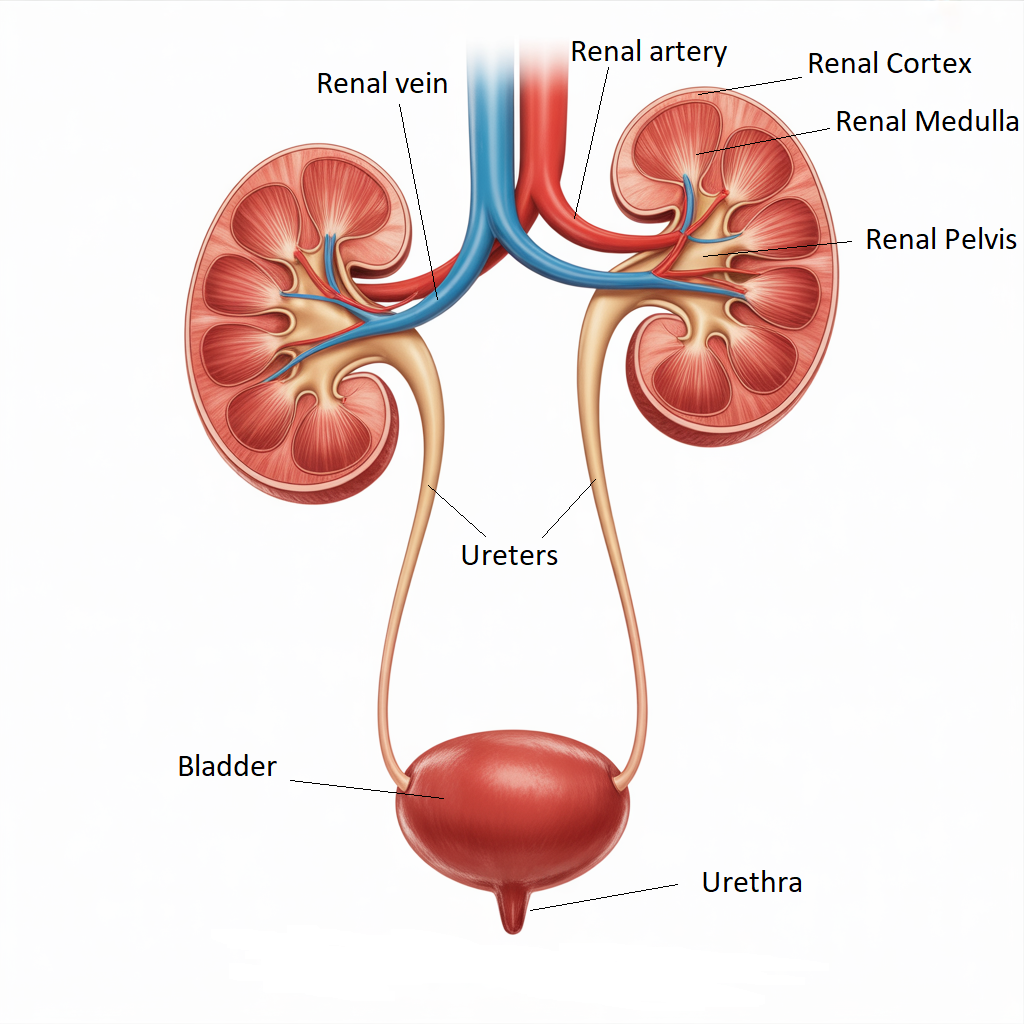Stem Cell Therapy in Chronic Kidney Disease (CKD): The non-invasive natural recovery of chronic kidney disease
The kidney is one of the most important organs in the human body. It plays a vital role in the body. The main function of the kidney is filtration. It filters the waste from the blood and excretes waste materials from the body through urine. It also regulates fluid balance and electrolytes in the body. It also maintains blood pressure by producing hormones and helps to produce red blood cells. Besides this, it also has a significant role in acid-base balance in the body. These bean-shaped filtering organs of the body constantly remove toxins and return nutrients from the urine by filtering the urine. Sometimes, these filtration processes are disrupted for various underlying causes such as cardiac disease, DM, vascular disease, metabolic disease, autoimmune disease and genetic factors.

What Is Chronic Kidney Disease (CKD)?
Chronic Kidney Disease refers to a long-term and progressive loss of kidney function. The kidneys, each roughly the size of a computer mouse, play a crucial role in maintaining the body’s internal balance. Every 30 minutes, they filter all the blood in the body — removing wastes, toxins, and excess fluids.
They also regulate acid levels, maintain the balance of water, salts, and minerals such as sodium, calcium, phosphorus, and potassium, and produce hormones that help control blood pressure and red blood cell production.
When the kidneys become damaged over time, they lose their ability to perform these vital functions effectively, leading to the accumulation of toxins and fluids in the body. This condition can contribute to high blood pressure, heart disease, stroke, and even premature death.
Causes and Risk Factors
The two most common causes of CKD are:
Diabetes – Approximately 1 in 3 adults with diabetes may develop chronic kidney disease.
High blood pressure (Hypertension) – About 1 in 5 adults with hypertension are affected by CKD.
Other contributing factors include obesity, cardiovascular disease, prolonged use of certain medications, and a family history of kidney disorders.
Global and U.S. Statistics
According to the Centers for Disease Control and Prevention (CDC):
More than 1 in 7 U.S. adults (around 35.5 million people, or 14%) are estimated to have CKD.
Up to 9 in 10 adults with CKD do not know they have it, as symptoms often appear only in advanced stages.
Kidney disease is one of the leading causes of death in the United States.
Every day, about 360 people begin treatment for kidney failure through dialysis or kidney transplant.
CKD is typically progressive, meaning kidney damage worsens over time and is often irreversible. When kidney function falls below 15% of normal capacity, it results in kidney failure or End-Stage Kidney Disease (ESKD), requiring dialysis or a kidney transplant to sustain life.
The Role of Stem Cell Therapy in CKD
Conventional treatments like dialysis and transplantation are life-saving but come with major drawbacks — they are invasive, expensive, and limited by donor availability.
Stem cell therapy offers a revolutionary approach by promoting regeneration of damaged kidney tissues and restoring normal kidney function naturally.
This therapy utilizes the body’s own regenerative potential, making it non-invasive and biologically compatible. Clinical studies suggest that stem cells can reduce inflammation, enhance tissue repair, and slow CKD progression, offering hope for millions of patients worldwide.
Symptoms of CKD
- Fatigue and tiredness
- Swelling of the feet and ankles
- Change in urination (more or less frequency, foamy or bloody in the urine)
- Dry, itchy skin
- Nausea and loss of appetite
- Weight loss
- Muscle craps
- Muscle cramps
Stages of CKD
Stage 1
GLOMERULAR FILTRATION RATE (GFR) (ml/min) : 90 or higher
What does IT MEAN?:Mild kidney damage, Kidneys still work
Stage 2
GLOMERULAR FILTRATION RATE (GFR) (ml/min) : 60-89
What does IT MEAN?: Mild kidney damage, Kidneys do not function at their optimal
Stage 3A
GLOMERULAR FILTRATION RATE (GFR) (ml/min) : 45-59
What does IT MEAN?: Moderate kidney damage
Stage 3B
GLOMERULAR FILTRATION RATE (GFR) (ml/min) : 30-44
What does IT MEAN?: Moderate to Severe kidney damage
Stage 4
GLOMERULAR FILTRATION RATE (GFR) (ml/min): 15-29
What does IT MEAN?: Severe kidney damage, Kidney is working at suboptimal levels.
Stage 5
GLOMERULAR FILTRATION RATE (GFR) (ml/min): Less than 15
What does IT MEAN?: Most severe kidney damage, Kidneys are very close to not working or have failed
Stem Cell Therapy for CKD
Stem cells have self-renewal capability, which is important for new healthy cell generation. It promotes many therapeutic benefits, especially mesenchymal stem cells which have wonderful therapeutic benefits in CKD. For the regenerative therapy mesenchymal stem cells help restore the functional integrity of kidney cells which is called nephrone. Research shows that mesenchymal stem cell therapy helps to reverse or slow down the prognosis of CKD.
Stem cells for kidney treatment also show potential anti-inflammatory benefits, which are expected to effectively reduce inflammation in the nephrons and other kidney tissues. The reduction of inflammation could enable the body to initiate healing processes, which might have been previously increased, supporting a favorable prognosis. It is believed by the researcher that stem cell therapy for kidney disease could advance the treatment of CKD.
In our treatment, 100% CKD stage 3 kidney patients recovered and are living a normal life.
Indications and Contraindications for Stem Cell Therapy for Kidney Failure
- Chronic inflammation in the nephron and kidney tissues.
- Autoimmune condition (SLE)
- Chronic Progressive renal condition such as nephrotic syndrome
- Organ damage is associated with the side effects of medications such as chemotherapy.
Advantages of Stem Cell Therapy for Chronic Kidney Disease CKD
Stem Cell Therapy, especially mesenchymal stem cell therapy has various advantages for the patients of chronic kidney disease. It can reduce inflammation, regenerate new kidney cells, increase immunity, enhance the survival and function of kidney cells by trophic factors.
How Stem Cells Work on Chronic Kidney Disease CKD ?
Mesenchymal stem cells have self-renewal and differentiation potential in the following way-
Anti-inflammatory effects
The anti-inflammatory effects of mesenchymal stem cells repair the nephrons of the kidney. Mesenchymal stem cells can transform macrophages from pro-inflammatory M1 to anti-inflammatory M2 states by increasing tregs and reducing Th1/Th17 activity. Stem cell therapy can lower the cytokines such as Interleukin-1β (IL-1β) or Interleukin-6 (IL-6) or TNF-α. In a research paper we found that clinical and preclinical studies show improvement in inflammatory profiles and consistent improvements of creatinine/eGFR and albuminuria which represent these effects.
Regenerative Potentials
Stem cell therapy has the potential to regenerate new cells in the kidney. For this regenerative potential, stem cells can help to replace damaged tissue in the kidneys with new cells and restore the functional efficiency of these organs. It can regenerate nephrons in the kidneys. These new cells recover the functional efficiency of organs.
As a result kidneys can filter the blood properly and excrete waste products of the body through urine and balance body fluids.
Immunomodulatory effect
Mesenchymal stem cells have the ability to achieve immunomodulation in the patient with kidney disease. It promotes the production of tregs, which can influence immune systems to inhibit the activation and proliferation of NKT cells, B cells, and DCs. By the power of immunomodulation, mesenchymal stem cells can inhibit cell degeneration and promote new cell regeneration. New cells replace the old defective cells and restore the kidneys’ functions.
Anti-Apoptosis
Apoptosis of the cell is responsible for kidney injury and kidney disease progression. Mesenchymal stem cells have a paracrine mechanism that plays an important therapeutic role in kidney disease. For example, exosomes released by mesenchymal stem cells inhibited apoptosis of NRK-52E cells induced by cisplatin via activation of the ERK1/2 pathway.
Pro-Angiogenesis
Mesenchymal stem cells have the ability to affect angiogenesis in kidney cells. Angiogenesis can help to produce new cells and restore the kidneys’ normal function.
Anti-fibrosis
One of the common pathological signs of CKD progression is interstitial fibrosis and which leads to the end-stage of kidney disease.
BMMSCs treatment prevents renal interstitial fibrosis by blocking the Akt/GSK3β/Snail signaling pathway in adenine-induced CKD. Study proved that glial cell line–derived neurotrophic factor–modified ADMSCs suppressed EMT and renal fibrosis via inhibition of the PI3K/Akt pathway in CKD9.
Regulate Autophagy
Mesenchymal Stem Cells can regulate autophagy and help to treat CKD or end-stage kidney disease patients without any major side effects. A study provides significant proof that adipose tissue-derived Mesenchymal stem cells’ exosomes enhanced autophagy and reduced podocyte apoptosis, leading to improved Diabetic Kidney Disease (an end-stage kidney disease) as evidenced by reduced levels of urine protein and serum creatinine, and blood urea nitrogen in mice.
Types of Improvements Can Be Expected a Chronic Kidney Disease Patients From Stem Cell Therapy
Many research papers have proved that stem cell therapy can manage renal dysfunction. Someone with chronic kidney disease can expect various improvements, such as
- Symptom relief: Fluid retention, edema, breathing difficulty, reduced urination.
- Improve serum creatinine, absence of protein passage with urine.
- Improve kidney function.
- Improve GFR.
- Reduction of inflammation.
- Repair, regenerate and replace damaged kidney cells.
- Delay disease progression.
- Reduction of dialysis dependence.
- Improve quality of life, improve energy levels and tiredness problems.
It is very important to keep in mind that patient improvement of kidney disease through stem cell therapy can vary from patient to patient, for the stage of disease, comorbidities and stem cell therapy protocols.
FAQ ?
Stem cell therapy for kidney disease involves the use of stem cells to repair or regenerate damaged kidney tissues. The goal is to improve kidney function and reduce symptoms associated with kidney disease
Stem cells can differentiate into different cell types including kidney cells. They can migrate to the damaged areas of the kidney to help regrow healthy cells. They have the ability to travel to the site of injury. Our studies show reduced inflammation, and the process of regeneration of healthy and more potent cells in many cases
Stem cell therapy has shown promise in the treatment of various kidney diseases, including chronic kidney disease, acute kidney injury, polycystic kidney disease among others.
Stem cells can be administered through various methods, such as intravenous injection, direct injection into the kidney or through targeted delivery using catheters
The potential benefits of stem cell therapy for kidney disease include, improved kidney function, reduced symptoms, decreased inflammation, slowed disease progression, and enhanced quality of life. However, effectiveness can vary depending on the individual and the specific kidney disease
Several clinical trials showed no adverse effect on mesenchymal stem cell therapy for the treatment of chronic kidney disease. In contrast, some minimal side effects are shown. However, stem cell therapy is approved by the FDA and EMA for clinical use.
